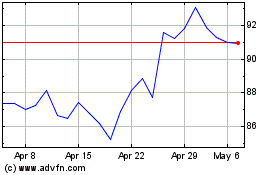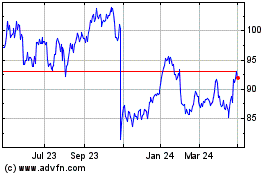Drug Study Halted Early for Certain Covid-19 Patients After No Benefit Seen
April 27 2020 - 7:29AM
Dow Jones News
By Joseph Walker
Regeneron Pharmaceuticals Inc. and Sanofi SA said Monday they
will shut down part of a study exploring whether their arthritis
therapy could treat certain hospitalized Covid-19 patients because
the drug looked unlikely to help them.
An early look at ongoing trial results indicated the therapy,
named Kevzara, wasn't helping patients who were hospitalized with a
severe form of Covid-19 but don't require a ventilator's assistance
with breathing, the companies said.
The study will continue, however, for an even sicker set of
hospitalized Covid-19 patients who require the help of ventilators
or other high-flow oxygen support, the companies said.
In the second, sicker group of patients, the drug showed a
relatively small potential benefit over placebo -- substances with
no actual pharmaceutical effect -- though that will need to be
confirmed in the ongoing study, the companies said. Results are
expected in June.
"There's still hope it might help, but more modest than people
hoped," Regeneron Chief Medical Officer George D. Yancopoulos said
in an interview. "It doesn't look like the magic panacea that
everyone would've wanted for the pandemic."
Dr. Yancopoulos said the results underscored the need to perform
placebo-controlled studies of potential treatments for Covid-19 and
not rely on anecdotal reports that have circulated in the medical
community as doctors have scrambled to find treatments.
"We don't want mirages, we don't want fake cures, we want real
therapeutics that make a difference," he said.
Kevzara was approved in 2017 to treat rheumatoid arthritis, a
disease caused by an immune system that attacks healthy tissue.
Researchers theorized the drug might help Covid-19 patients whose
immune systems go haywire in response to the new coronavirus.
Regeneron and Sanofi launched a U.S. clinical trial last month
to study the drug's ability to stop the hyperactive immune response
of some coronavirus patients that is thought to contribute to a
higher risk of death. The companies began studying the drug based
on a small, non-placebo-controlled study in China that showed a
similar drug helped nearly all study subjects recover from
Covid-19.
The trial was divided into two parts: a smaller, phase 2 study
and a larger, phase 3 study. Normally the third phase follows
completion of the second, but the companies began conducting the
two simultaneously to more quickly determine whether the drug
worked in treating Covid-19. It usually takes years to advance drug
studies into phase 3, which is usually the final stage before a
drug is considered for regulatory approval.
Both phases compared Kevzara to placebo in two groups of
hospitalized patients. Patients were assigned to a "severe" group
if they were receiving oxygen support short of being on ventilators
or receiving high-flow oxygen through nasal tubes; a second group
was termed "critical" if they were on ventilators, receiving
high-flow oxygen support or in an intensive-care unit.
An independent committee monitoring the study found that the
severe patients receiving Kevzara in the phase 2 segment appeared
to do worse than the placebo group, the companies said. In the
larger phase 3 segment, severe patients did about the same in both
the Kevzara and placebo groups.
The committee recommended that the companies stop treating
severe patients because the drug was unlikely to help them, the
companies said.
The severe group taking placebos did better than the companies
had expected, which Dr. Yancopoulos said indicated the course of
the disease in hospitalized patients still isn't well
understood.
If the study didn't have a placebo group, it may have looked as
though the drug was helping patients recover, though they would
have even without treatment, Dr. Yancopoulos said.
Data from the phase 2 study suggests the drug may help some
critical patients, but the results will have to be confirmed in the
phase 3 study, the companies said.
Among critical patients receiving placebo, 55% died or were on
ventilators after the study, compared with 46% of patients treated
with 200 milligram doses of Kevzara, and 32% of patients receiving
400 milligram doses of Kevzara, the companies said.
At the advice of the independent committee, the companies said
they would continue treating critical patients in the phase 3 study
using only the 400 milligram dose or placebo.
Write to Joseph Walker at joseph.walker@wsj.com
(END) Dow Jones Newswires
April 27, 2020 07:14 ET (11:14 GMT)
Copyright (c) 2020 Dow Jones & Company, Inc.
Sanofi (EU:SAN)
Historical Stock Chart
From Mar 2024 to Apr 2024

Sanofi (EU:SAN)
Historical Stock Chart
From Apr 2023 to Apr 2024
